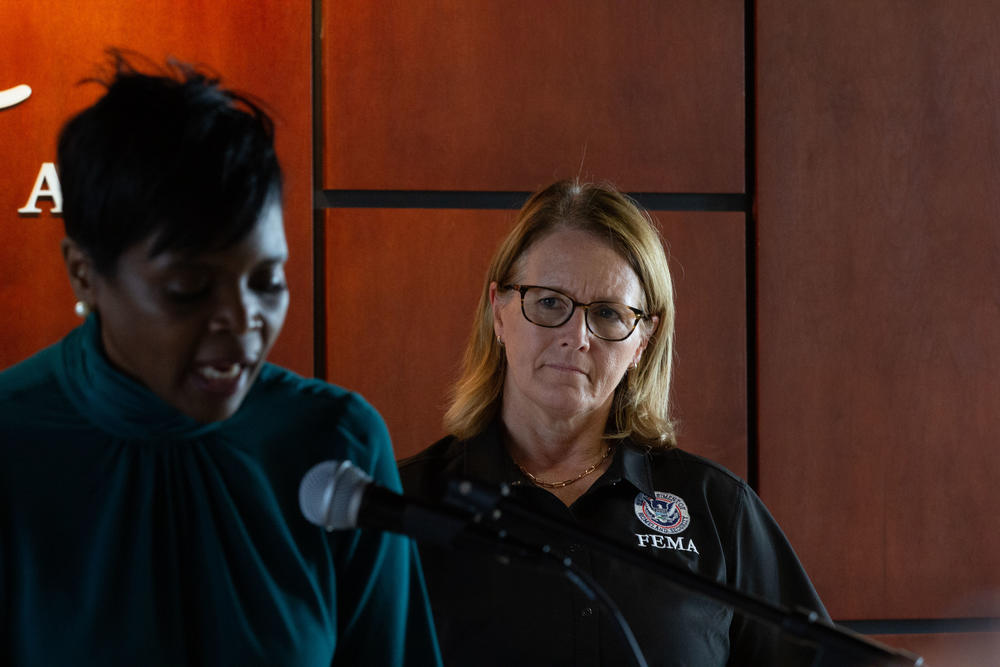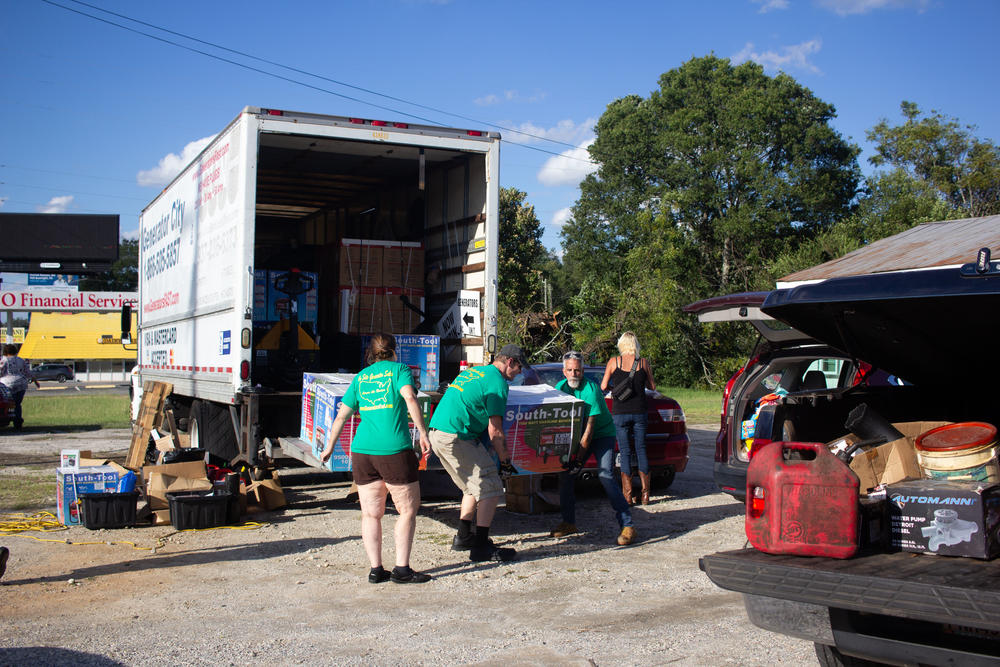
Caption
FEMA Administrator Deanne Criswell (right) listens to Richmond County administrator Tameka Allen during a visit to Augusta, Ga., on Oct. 23 to provide updates on disaster response.
Credit: Sofi Gratas/GPB News
Clinch County is just one of nearly three dozen counties devastated by Hurricane Helene. Just like other areas in the storm's path, people are still not back on their feet almost two months later.
“There are still a lot of people who were impacted by fallen trees on their homes,” said Angela Handley, CEO of Clinch Memorial Hospital. “We had some physical damage to the exterior of our buildings and so forth, and we still haven't had those repairs done.”
It’s not surprising, as local governments and insurance agents have been overwhelmed with calls for help. That leaves neighbors to help neighbors in many cases. In Helene’s aftermath, staff at Clinch Memorial, located in the county seat of Homerville, became responsible for feeding hundreds of people who had lost water and power.
“We served over 7,000 meals during that first week,” Handley said. “We had to react and try to provide services as best as we could.”
Handley said they were only able to pull it off with power from a backup generator, something only the hospital and possibly a few other businesses had access to. Power was lost everywhere else for almost a week.
“The number of people that are just coming to our ER who wanted to hook up to our oxygen because they had not planned for businesses to be closed for seven days — I mean, that's life or death,” Handley said.
Two hours north in Treutlen County, heavy rain had once again flooded Soperton in the second week of November.
While a precipitation monitor in a nearby river shows about 6 inches of rain fell between Nov. 7 and Nov. 14, it was enough to cause minor flooding flooding and delay County Manager TJ Hudson from getting out of his house. Like many of his neighbors, Hudson lives off a gravel road that's still fragile since Helene. They’re also still struggling to get debris picked up.
Then, of course, there's the widespread losses among some of his neighbors.
“As far as the agriculture side, it was a complete loss for farmers,” Hudson said. Farmers in the area produce mostly cotton, peanuts and run tree farms.
Hudson applauded Georgia Gov. Brian Kemp’s Nov. 1 allocation of $100 million to farmers and timber producers. That money’s been directed to a new fund under the Georgia Development Authority to provide direct disaster relief.
Hudson expects continued support from state leaders.
“It's just been an ordeal, let me just say that,” Hudson said.
The Federal Emergency Management Agency has approved over 181,000 applications for individual assistance from people in Georgia affected by Hurricane Helene, worth about $232 million. That doesn’t include applications for loans through the Small Business Administration or disaster unemployment. Costs from damage incurred is also expected to reach that of "truly historic events."

FEMA Administrator Deanne Criswell (right) listens to Richmond County administrator Tameka Allen during a visit to Augusta, Ga., on Oct. 23 to provide updates on disaster response.
On a recent press call, FEMA Administrator Deanne Criswell shared her agency's plea to be able to continue recovery efforts — a request for an additional $40 billion was sent to Congress this week. That’s on top of the $7.5 billion already allocated for those two storms.
“Spending on the first month post landfall for each storm outpaced nearly all disasters that we have responded to over the last 20 years,” Criswell said. Disaster declarations are also up around 50% from last year, she said.
Criswell and other top administrators under the Biden administration said they are hopeful for an immediate response to the requested spending package, which also includes $24 billion for the Department of Agriculture, $8 billion for the Department of Transportation and $3 billion for the Department of Health and Human Services. Without it, FEMA will run out of money before the end of the fiscal year.
Still, this aid is part of what Handley sees as the first wave in disaster relief, helping meet people’s immediate needs for food, water and shelter. To move on to long-term recovery, communities affected by recent hurricanes will need more support from the state and federal government.
“I just think it would be foolish for everyone to think it won't happen again,” Handley said. “How are we going to survive the next one?”
At the first meeting of the Georgia Senate subcommittee on Disaster Resilience and Mitigation, members were urged to create a statewide plan that would standardize disaster response, which has at this point been managed by a variety of agencies with different access to resources.
It’s something other states have done with success, said University of Georgia professor Brian Bledsoe in a presentation to lawmakers. Bledsoe also runs the Institute for Resilient Infrastructure Systems at UGA.
Recent back-to-back storms are a testament that we no longer live in a “one hazard” world,” Bledsoe told lawmakers. And as floods and extreme temperatures become more common in the South, “random acts of kindness” will not be enough.
“And a lot of people talk about, 'well, we need capacity,'" Bledsoe said. "And then you have to ask, 'what is capacity?' It's a lot of things. It's people that can write grants. … it's staff embedded across sectors. And it’s some state-level guiding vision for resilience.”
It will be up to elected officials to approve that vision, in order to help prepare for disasters before they happen.
In the meantime, GEMA Hazard Mitigation officer Stephen Clarke told lawmakers that most money the agency is able to funnel into communities comes from Hazard Mitigation grants or assistance, a program overseen by FEMA. Clarke estimated that the next infusion into that program for Hurricane Helene may be “the largest single disaster funding” they’ve had access to, though the grant process can be arduous.
With these grants, public agencies and some private nonprofits and other institutions that offer essential services can get money to fund projects that reduce the risk of future damage.
Other presentations at the meeting — the second is scheduled on Nov. 21 — asked lawmakers to consider investments in coastal ecosystems, which when protected can help stem damage from heavy storms.
Georgia’s next legislative session starts on Jan. 13. State Sen. Blake Tillery, who chairs the Appropriations Committee, says if Kemp’s initial investment is any indication, disaster recovery will be top of mind.
“I'm really glad that Gov. Kemp's already taken steps while the Legislature is not in session, through some of the avenues we created due to strong budgets, to put money directly out immediately,” Tiller said. “And I'm confident that those will continue.”
Lawmakers could also propose public funds for more direct aid, like backup generators, updates to local emergency shelters and food storage facilities.
“I'm hoping we'll be in a position to provide some grants for that kind of thing,” said Sen. Larry Walker, who represents constituents in Laurens, Treutlen and Dodge counties, all affected by the storm.

People line up to buy generators off a truck Sept. 27, 2024, in Sandersville, Ga., in the wake of Hurricane Helene.
Walker said he plans to introduce a bill, “if nobody else does,” that establishes a reforestation program to encourage the replanting of timber. Helene caused generational losses among timber farmers, since the trees can take two decades to grow.
“It’s in the public interest to get this land cleaned up and in the public interest to get it replanted and back in production,” Walker said.
He also plans to have the insurance and labor commission look into fraud and establish greater consumer protections.
Sen. Russ Goodman, who represents Clinch, Lowndes and Ware counties, among others, said he is “fully committed to making sure we recover and build back stronger than ever.”
“Whether it’s improving infrastructure, supporting our farmers or ensuring we’re better prepared for the next storm, this will be one of my top priorities,” Goodman wrote in an email.
During the Disaster Resilience and Mitigation subcommittee, Goodman, who is also a member, said he’s also concerned about getting generators that can power cellphone towers in the case of power outages.
These are all investments that would be useful to Angela Handley with Clinch Memorial Hospital. She said after conversations with state lawmakers and other representatives — U.S. Sen. Raphael Warnock's team set up a sort-of resource fair at the hospital last week — she feels confident that support will get funneled into communities like hers.
“They saw the vulnerabilities of areas both urban and rural," Handley said.
Still, she said she's been coordinating independently with other hospitals nearby to establish better plans for communication and resource-sharing ahead of the next hurricane season. In many rural counties, hospitals are a lifeline both economically and in terms of available infrastructure.
Handley said they intend to be prepared the next time a storm comes.